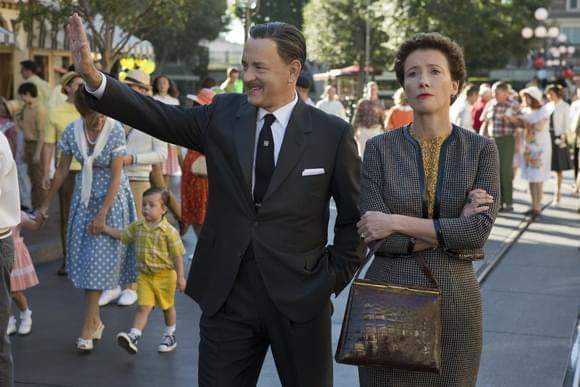Saving Mr. Banks

Director(s): John Lee Hancock
Writer(s): Kelly Marcel and Sue Smith
Cast: Emma Thompson, Tom Hanks, Paul Giamatti, Jason Schwartzman, Bradley Whitford, Annie Rose Buckley, Ruth Wilson, B.J. Novak, Rachel Griffiths, Kathy Baker, Colin Farrell and Melanie Paxson
Reviewed by: Ian Evans on
Release Date(s)
Dec 20, 2013 - WidePerhaps the Walt Disney Corporation isn’t the most impartial studio to create a film about the two decade long struggle Walt Disney had trying to convince author P.L. Travers to sign over the film rights to her book, Mary Poppins. While John Lee Hancock’s Saving Mr. Banks shows the battles between Disney and Travers, it glosses over the legal finesse in the contract that gave Walt final production say, allowing him to slip in elements, like animation, that Travers abhorred. It’s also not noted that Travers would never again deal with Disney for her books or that her final will and testament forbade anyone connected with the production to ever touch her works again.
Still this is the 50th anniversary of Mary Poppins (with a spanking new Blu-ray release), so the Mouse House has released their version of the events, with two Oscar winners, Tom Hanks and Emma Thompson playing the battling creative titans.
The film starts off in 1906 Australia, where a young Helen Goff (Annie Rose Buckley) lives with her mother (Ruth Wilson), her siblings and her free-spirited dreamer of a father, Travers Goff (Colin Farrell). Through a series of flashbacks, we learn that Travers was not only free-spirited but under the influence of spirits most of the time. The events of this childhood shaped the young girl, who flashing forward to 1961, writes under the name of P.L.Travers. Travers, author of Mary Poppins, has resisted the artistic overtures of producer Walt Disney for many years, but with writer’s block and financial woes looming, she finally listens to her manager and flies from London to Los Angeles for exploratory meetings.
Landing at LAX, Travers meets her driver, Ralph (Paul Giamatti), a chatty, amiable man who is the complete opposite of the icy, always-correcting Travers. Ralph is positively stodgy compared to the powerful film producer, who insists that everyone call him Walt. Travers is introduced to the screenwriter (Bradley Whitford) and songwriters (B.J. Novak and Jason Schwartzman) who have been given the task of trying to convince her to sign over the film rights. Travers, who doesn’t believe her book lends itself to the Disney brand of “chirping and prancing”, battles with the creative team every step of the way, slowly revealing how entwined these characters are with her own personal history.
A pure look at the creative battles would have been entertaining enough, but the momentum of these scenes keeps getting hammered by the flashbacks to her father’s drunken descent and the family misery that follows. Just as we’re getting into one sixties scene, the brakes slam on and as whiplash sets in we’re whisked back to Australia at the beginning of the century to gives us another reminder of why she’s now like this. We get it. Her childhood sucked. We understand…but how’s she dealing with it now? It’s outside the scope of the film, but the answer is “not well”, as in real-life Travers adopted one child of twin boys, an act that later sent both to the bottle. This was a woman who really didn’t believe in Disney endings.
Tom Hanks plays Walt Disney as a savvy businessman whose driving force for this project was a promise made to his daughters. As a Disney film, we don’t really see how ruthless a businessman Walt could be, with just a brief glimpse as he declines to invite Travers to the premiere, knowing how her personality might generate negative press. Whitford, Novak and Schwartzman really sell the jokes and songs as they slowly begin to chip away at Travers’ icy exterior. Giamatti’s Ralph is a gentle soul and probably the only person who truly reaches Travers. Farrell is able to capture the energy and pathos of a man imprisoned by his life and temporarily freed by alcohol, while unfortunately, Wilson isn’t given much more to do than furrow her brow in concern or distaste.
The real star of Saving Mr. Banks is Emma Thompson, who takes us on the journey of a woman who does her best to keep people away from the pain within. One moment, Thompson plays her as imperious, the next, we see the demons and desires that she deals with when she’s alone.
Unfortunately, the constant interruption of the flashbacks ruins the rhythm of this character study. While the story might have worked as a mini-series, the disjointed beats make it feel longer than its 125 minutes.